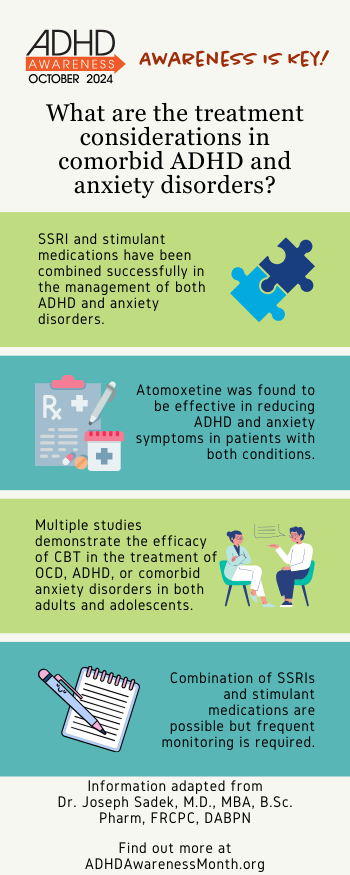Some authors raised concerns that stimulant medications may lead to exacerbation of anxiety disorders and sleep problems in patients with comorbid ADHD and anxiety disorders. Some reports suggest that anxiety does not lessen response to ADHD stimulant treatment.

Some authors raised concerns that stimulant medications may lead to exacerbation of anxiety disorders and sleep problems in patients with comorbid ADHD and anxiety disorders 1,2,3. Some reports suggest that anxiety does not lessen response to ADHD stimulant treatment [4].
Combinations of SSRI and stimulant medications have been combined successfully in the management of both conditions [5, 6].
Atomoxetine was found to be efficacious in reducing ADHD and anxiety symptoms in patients who had both conditions.
Multiple studies demonstrate the efficacy of a cognitive-behavioral therapy intervention (CBT) in the treatment of OCD, ADHD, or comorbid anxiety disorders in both adults and adolescents. Nonpharmacological, psychosocial intervention may be a useful adjunct to pharmacotherapy in patients with ADHD and anxiety.
Some guidelines recommend treating the most disabling disorder first. If clinicians start with ADHD treatment with a stimulant medication and the anxiety symptoms increase, then stimulant medication should be decreased or discontinued.
Combination of SSRIs and stimulant medications are possible but frequent monitoring is required.
About the Author

Dr. Joseph Sadek, MD, MBA, B.Sc. Pharm, FRCPC, DABPN
Dr. Sadek is a Professor of Psychiatry at Dalhousie University and the clinical and academic leader, Nova Scotia Hospital, Mayflower Unit and the head of the psychopharmacology consultation service for the Nova Scotia Health authority. He was the vice president of CADDRA and currently a member of CADDRA advisory board.
Dr. Sadek is a Diplomat of the American Board of Psychiatry and Neurology (DABPN) and fellow of the Royal College of Physicians and Surgeons of Canada (FRCPC) (2005). In addition to his medical degree, Dr. Sadek also holds a pharmacy degree (B.Sc. Pharm) and an MBA from St. Mary’s University in Halifax. He served as the provincial chair the Nova Scotia Suicide Prevention Initiative and member of the provincial education and training committee.
Dr. Sadek completed his psychiatry residency training at Dalhousie University and his psychopharmacology research training and one-year Global Clinical Scholars Research Training program at Harvard University.
Dr. Sadek is actively involved in both the undergraduate and postgraduate teaching and served at the Senate of Dalhousie University. He has over 70 publications including books, book chapters and peer reviewed articles. He served as principal investigator for several clinical trials. Dr. Sadek received several awards and grants. He is the author of 5 books, The latest on Psychopharmacology.
References
- Duong S, Chung K, Wigal SB (2012) Metabolic, toxicological, and safety considerations for drugs used to treat ADHD. Expert Opin Drug Metab Toxicol 8(5):543–552 ↩︎
- Pliszka SR (1989) Effect of anxiety on cognition, behavior, and stimulant response in ADHD. J Am Acad Child Adolesc Psychiatry 28:882–887 ↩︎
- van der Oord S, Prins PJ, Oosterlaan J et al (2008) Treatment of attention deficit hyperactivity disorder in children: predictors of treatment outcome. Eur Child Adolesc Psychiatry 17:73–81 ↩︎
- Abikoff H, McGough J, Vitiello B, McCracken J, Davies M, et al. (2005) RUPP ADHD/Anxiety Study Group. Sequential pharmacotherapy for children with comorbid attention-defi cit/hyperactivity and anxiety disorders. J Am Acad Child Adolesc Psychiatry. 44(5):418–427. ↩︎
- Lavretsky H, Reinlieb M, St Cyr N, Siddarth P, Ercoli LM, Senturk D (2015) Citalopram, methylphenidate, or their combination in geriatric depression: a randomized, double-blind, placebo-controlled trial. Am J Psychiatry 172(6):561–569. ↩︎
- Koran LM, Aboujaoude E, Gamel NN (2009) Double-blind study of dextroamphetamine versus caffeine augmentation for treatment-resistant obsessive-compulsive disorder. J Clin Psychiatry 70(11):1530–1535 ↩︎
